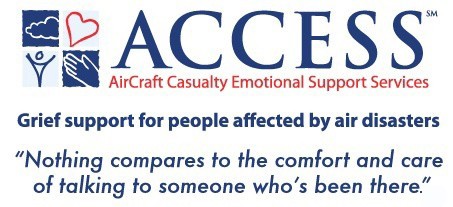 I am a U.S. Navy Psychiatrist in Norfolk, Virginia who has been involved in disaster response work for over a decade. Among the many situations over the years, I have assisted in the psychological backup of those who recovered bodies from small air disasters involving military aircraft. TWA 800 and especially Swissair 111 changed all that.
I am a U.S. Navy Psychiatrist in Norfolk, Virginia who has been involved in disaster response work for over a decade. Among the many situations over the years, I have assisted in the psychological backup of those who recovered bodies from small air disasters involving military aircraft. TWA 800 and especially Swissair 111 changed all that.
I spent only 2 days at East Moriches, New York in support of the TWA 800 recovery operations. In contrast, I spent over two weeks in Nova Scotia as the backup for Navy divers and other military personnel who could have experienced signiï¬cant or impairing distress from recovering or handling remains. I spent considerable time interviewing townspeople along the coast near the crash site, ï¬shermen, Canadian defense force personnel working along the coast as well as at the Shearwater morgue, and even the Medical Examiner, Dr. John Butt. I spent time at sea at the crash site, soberly reflecting on the fact that the calm water surface around me was a recent scene of unspeakable violence, and that 190 feet below me rested remains of 229 persons who were alive, living and loving life until that fateful night. I spent time observing RCMP cataloging personal effects and time at the morgue observing while remains were handled and cataloged; I did this to pinch myself back to reality that these 229 persons were real people, not just victims as reported in the media. During this time, I did not talk with any family members there. However, while up there, I did call and then later meet with a woman in my Norfolk area who lost her parents in that crash.
I have also learned much from my readings and from speaking at conferences. Peter Richmond published My Fathers War. A Sons Journey in I996 (Simon & Schuster), a memoir about his father serving in the Paciï¬c in World War II and the events leading up to and after his fathers death in a two-airliner collision over Brooklyn, NY in I960, when he was 6 years old. The novelist Larkin Warren published Surviving a Crash as an end piece in the August I8, I996 New York Times Magazine; it was a bittersweet recollection of the death of two of her sisters in a plane crash at Logan Airport, in Boston in 1976 and how that affected her life (I have sent a copy of the article to ACCESS to keep on ï¬le). Finally, the Canadian journalist Stephen Kimber published Flight 111. The Tragedy of the Swissair Crash (Seal Books, Random House, 1999), which has conveys the tumult of emotions–anger, sadness, confusion, and poignancy–that he gleaned from interviews with surviving family members, Transportation Board, other investigators, Swissair personnel, and the Nova Scotia families.
Last, I recently spoke at a conference on disaster psychiatry in New York City, Where I met other speakers who lost family aboard Swissair 111, Pan Am I03, and TWA 800. Their words and the emotions they showed are etched in my memory.
I believe: 1) surviving family members of those who perish in air disasters experience the loss in individualized indescribable ways that are incorporated as world views, which ï¬lters the way in which the world is looked upon every day afterwards; 2) there is no closure and 3) there is no sense to it all. Outward behaviors and emotions are a covering, a skin, from which those around infer how that person is doing. Under that covering, is the spirit and the soul, whose suffering is not open for inference.
I was asked by Heidi Snow, during a long walk we took in New York City last fall, to consider how a family (member) who lost another family member or friend in a commercial airline disaster”especially when it occurs far from home”and eventually seeks professional counseling, does ï¬nd the right counselor or therapist.
One way, is for that member to contact the American Group Psychotherapy Association headquarters in New York City. Their members”I am one”are located across the US and many, because they are therapists, do group therapy as part of their practices and often deal with trauma survivors in group or individual therapy. The AGPA headquarters staff can give the caller the name of the president of the regional society (the AGPA membership is divided into regions of states–called societies, each with its own ofï¬cers and telephone directory listing the names and addresses and phone numbers of all the therapists and each ones ï¬eld of experience and expertise) and his or her telephone number. The caller can contact that regional society president and ask for the names and phone numbers of therapists in the same area that the caller is from and which ones can help the caller adaptively (and eventually) integrate trauma and loss into that persons life as best as possible.
Last, persons from Canada who have suffered a loss from an aviation disaster and want counseling or therapy, could, as one resource, look at the website for the Canadian Group Psychotherapy Association, www.cdngrppsych.ca. Like AGPA, the CGPA is a national organization comprised of 7-chartered sections across the country, with members also practicing in cities and towns that dont have chartered sections. The website provides information, as well as names/phone numbers/email addresses of section heads and other key members.
Mark L. Dembert is a U.S. Navy Captain and Psychiatrist at the Naval Medical Center, Portsmouth, Virginia



